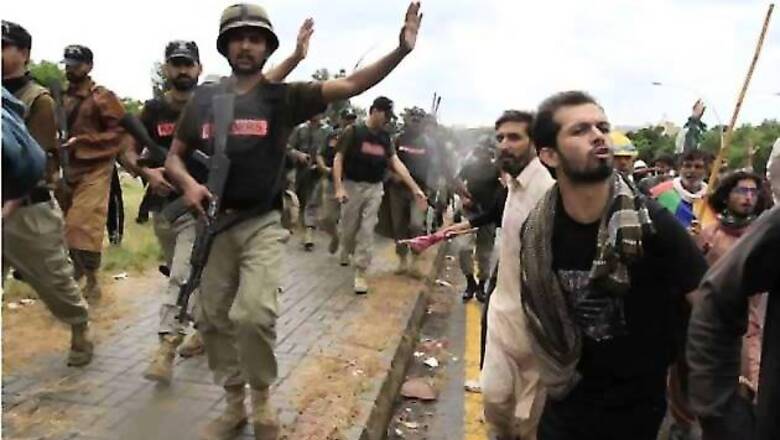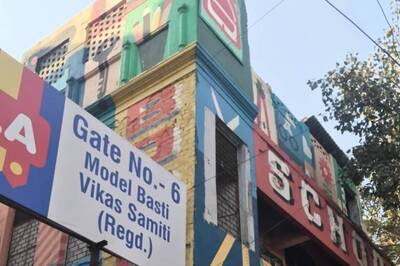
views
Islamabad: Pakistani soldiers and paramilitary forces entered the headquarters of the state television channel PTV in Islamabad on Monday after a crowd of protesters stormed the building and took the channel off the air.
Protesters led by opposition leaders Imran Khan, a hero cricket player turned politician, and Tahir ul-Qadri, a firebrand cleric, have been on the streets for weeks trying to bring down the government of Prime Minister Nawaz Sharif.
Sharif, who easily won an election in May 2013, has refused to step down. The demonstrations descended into deadly chaos on Saturday, with at least three people killed in clashes with police.
Clashes broke out early on Monday and the state PTV channel and its English-language PTV World service were taken off the air after protesters stormed its headquarters in Islamabad.
"They have stormed the PTV office," a news anchor said just before the screen went blank. "PTV staff performing their journalistic duties are being beaten up."
A PTV source said the protesters had occupied the main control room and smashed some equipment. Later, television pictures showed uniformed members of a paramilitary force and soldiers walking calmly into the building.
A witness said the soldiers escorted protesters out and placed the building under their protection. There were no signs of violence and the protesters were seen leaving the building peacefully. The station later came back on the air.
In the nuclear-armed nation where power has often changed hands through military coups rather than elections, the army is bound to play a key role in how the conflict unfolds but it has not directly intervened, apart from talking to the protagonists and calling on them to show restraint.
If the protests get out of control and there is major violence, the army could step in decisively, imposing a curfew or even martial law.
Alternatively it could side with the protesters and put pressure on Sharif to resign, in which case an interim government would have be put in place and early parliamentary elections held to elect a new government.
However, few observers believe at this stage that the army is bent on seizing power again.
A weakened Sharif would allow the army to remain firmly in charge of key issues such as relations with India and Afghanistan while allowing the civilian government to deal with day-to-day economic issues in which it has little interest.
Army warning
On Monday, despite heavy rain, crowds of protesters fought running battles with retreating police after breaking the main gate into the Pakistan Secretariat area which houses government ministries as well as Sharif's official residence.
The protesters could be seen beating motorcycles and cars with their sticks as they advanced closer to their target. They had tried to storm Sharif's house on Saturday night but were beaten back by police.
The head of Islamabad police and another senior police officer were lightly wounded in the clashes, media reported.
Sharif, who was prime minister twice in the 1990s, swept to office last year in Pakistan's first democratic transition of power. He is due to address both houses of parliament on Tuesday in an apparent effort to show that he is firmly in control.
But Sharif looks increasingly cornered in the conflict, and even if he survives the crisis he is likely to remain significantly weakened for the rest of his tenure.
The protesters out on Monday appeared to be from Qadri's camp.
Khan, who has refused to hold negotiations, says he would not call off the protests until Sharif resigns, calling on his people to avoid any form of violence.
"I call upon my workers to remain peaceful," Khan said from atop a shipping container at the main rally site. "Do not carry out any acts of violence. God has given us victory."
In a warning to police, the military said any further use of force to resolve an escalating political crisis would only worsen the situation. But it has also said the crisis had to be solved through talks, in a clear message to Khan and Qadri.
As protesters charged towards police lines in the so-called Red zone - home to the prime minister's house, parliament and many foreign embassies - security forces could be seen retreating, with police huddled in groups and avoiding direct confrontation.
Reflecting concern about security in the capital, all schools were closed on Monday, the start of a new academic year.
####




















Comments
0 comment